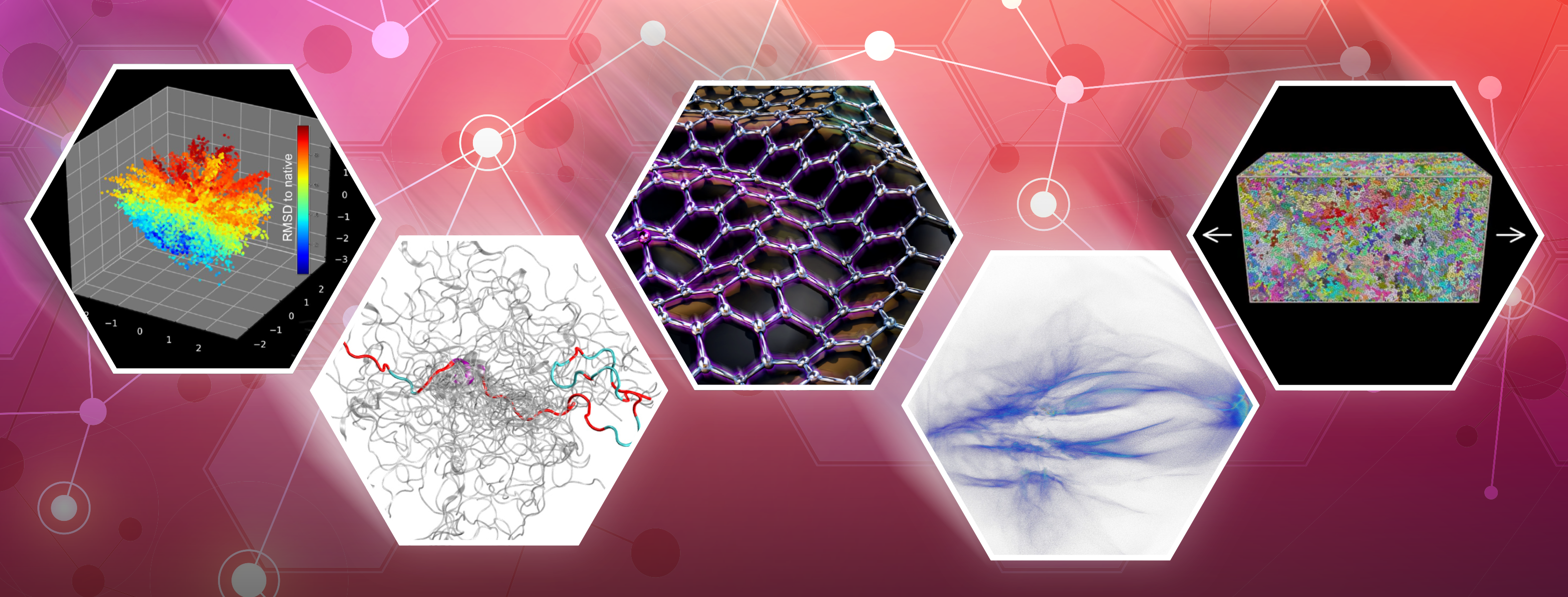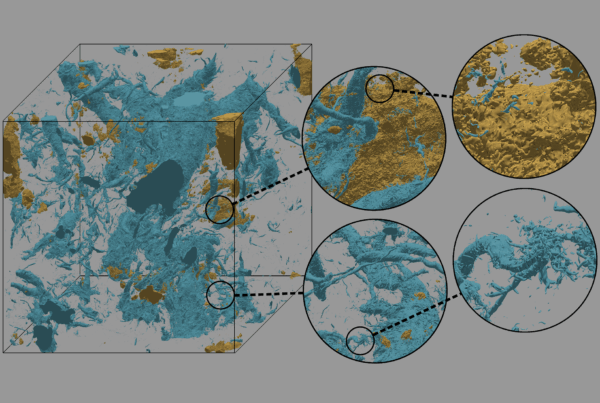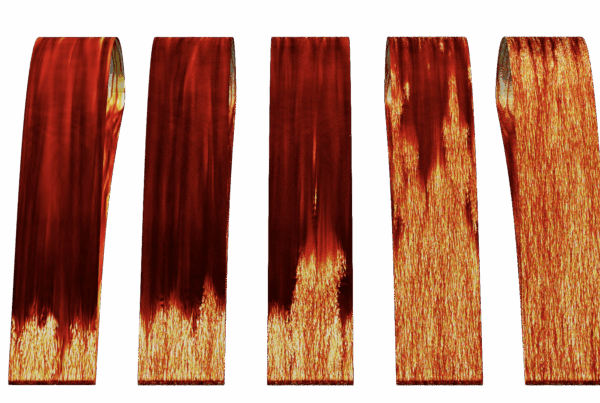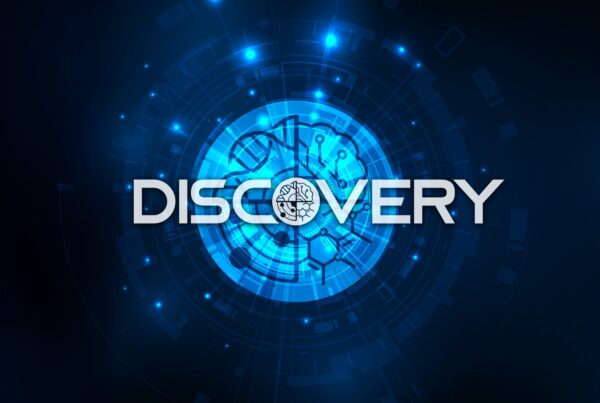Each year, researchers are awarded computing hours at the Oak Ridge Leadership Computing Facility (OLCF)—a US Department of Energy (DOE) Office of Science User Facility located at DOE’s Oak Ridge National Laboratory (ORNL)—through the DOE Office of Advanced Scientific Computing Research’s (ASCR’s) Leadership Computing Challenge (ALCC).
The ALCC program grants the 1 year allotments to scientists from industry, academia, and national laboratories whose work emphasizes high-risk, high-reward simulations in energy-related fields. The program allocates up to 30 percent of the high-performance computing resources at the OLCF and at Argonne Leadership Computing Facility (ALCF), as well as up to 10 percent at the National Energy Research Scientific Computing Center (NERSC) at Lawrence Berkeley National Laboratory.
This year, 31 research teams have been awarded a combined 5.87 million node hours on the Summit supercomputer, the OLCF’s 200 petaflop IBM AC922 system. The research performed through the ALCC program this year will range from the impact of jets on offshore wind farms to the structure and states of quantum materials to the behavior of plasma within fusion reactors—all computationally intensive scientific applications necessitating the power of a large-scale supercomputer like Summit.
The following are the 2020–2021 ALCC projects awarded time on Summit.
- Katerina Antypas from Lawrence Berkeley National Laboratory received 20,000 node hours for “Enabling Resilient and Portable Workflows from DOE’s Experimental Facilities.”
- Jeff Candy from General Atomics received 56,0000 node hours for “Multiscale Edge Turbulence in Fusion Plasmas.”
- Jan Michael Carrillo from ORNL received 183,000 node hours for “Nonlinear Rheology of Entangled Polymers.”
- Martha Constantinou from Temple University received 100,0000 node hours for “Proton Quasi-PDFs and Quasi-GPDs from Lattice QCD.”
- Stephen Priebe from GE Research received 230,000 node hours for “Flow Physics and Machine Learning Based Modeling of SBLI and WBLI in Transonic Compressors.”
- Carleton DeTar from the University of Utah received 100,000 node hours for “Precision Lattice QCD for Flavor Physics.”
- Jing Li from GE Research received 190,000 node hours for “Characterizing Coastal Low-Level Jets and Their Impact on Offshore Wind Farms.”
- Robert Edwards from Thomas Jefferson National Accelerator Facility received 100,000 node hours for “Confronting the New Challenges in Hadron Spectroscopy.”
- Michael Forbes from Washington State University received 300,000 node hours for “Quantum Turbulence in Fermi Superfluids.”
- Will Fox from Princeton Plasma Physics Laboratory received 62,000 node hours for “Energetics of Collisionless Plasmas in the Laboratory and Space.”
- Panchapakesan Ganesh from ORNL received 500,000 node hours for “Metastability in Driven Dynamical Systems for Next-Gen Microelectronics Applications.”
- Gary Grest from Sandia National Laboratories received 325,000 node hours for “Large- Scale Numerical Simulations of Polymer Nanocomposites.”
- Rajan Gupta from Los Alamos National Laboratory received 100,000 node hours for “Nucleon Matrix Elements: Probes of New Physics.”
- David Hatch from the University of Texas at Austin received 69,000 node hours for “Gyrokinetic Simulations of Multi-Scale Plasma Turbulence in Tokamaks.”
- Axel Huebl from Lawrence Berkeley National Laboratory received 108,000 node hours for “Elucidating Acceleration Mechanisms in Laser-Plasma Ion Accelerators.”
- Daniel Jacobson from ORNL received 400,000 node hours for “Global Climatype Clustering: Precision Agriculture for Bioenergy.”
- Jacek Jakowski from ORNL received 180,000 node hours for “Electronic Structure and Excited States Dynamics of Quantum Materials.”
- Elia Merzari from Pennsylvania State University received 150,000 node hours for “Toward Full-Core Multiphysics High-Fidelity Calculations.”
- Bronson Messer from ORNL received 130,000 node hours for “Portable Performance on Exascale Hybrid Architectures.”
- Swagato Mukherjee from Brookhaven National Laboratory received 100,000 node hours for “Probing QCD Crossover with Hyper-Skewness and Hyper-Kurtosis.”
- Amy Nicholson from the University of North Carolina at Chapel Hill received 100,000 node hours for “Electromagnetic Corrections to Strong Dynamics.”
- Kostas Orginos from William & Mary received 100,000 node hours for “Hadron Structure from Lattice QCD.”
- Robert Patton from ORNL received 150,000 node hours for “Evolutionary Multi-Scenario Simulation Environment for Autonomous Vehicle Testing.”
- Loukas Petridis from ORNL received 300,000 node hours for “Integrating HPC Molecular Simulation with Neutron Scattering to Study Complex Biological Systems.”
- Venkat Raman from the University of Michigan received 200,000 node hours for “Design of Next-Generation Energy Conversion Systems Using Extreme-Scale Computing.”
- Arvind Ramanathan from Argonne National Laboratory received 600,000 node hours for “Artificial Intelligence Directed Adaptive Multiscale Simulations to Model RAS-RAF Cancer Initiation Pathway.”
- Phiala Shanahan from the Massachusetts Institute of Technology received 100,000 node hours for “The Gluonic Structure of the Proton.”
- Ashley Shields from ORNL received 100,000 node hours for “Atomistic Bridges to Carbon Defects at Exascale.”
- Lucas Wagner from the University of Illinois Urbana-Champaign received 362,000 node hours for “QMC-HAMM: From the Nanoscale to the Mesoscale.”
- Brian D. Wirth from the University of Tennessee Knoxville received 155,000 node hours for “Plasma Surface Interaction Modeling.”
- Yiqi Yu from Argonne National Laboratory received 300,000 node hours for “Toward the Future: High-Fidelity Simulation for NextGeneration Nuclear Reactors.”
For a closer look at the selected projects, visit https://science.osti.gov/ascr/Facilities/Accessing-ASCR-Facilities/ALCC/ALCC-Current-Awards.
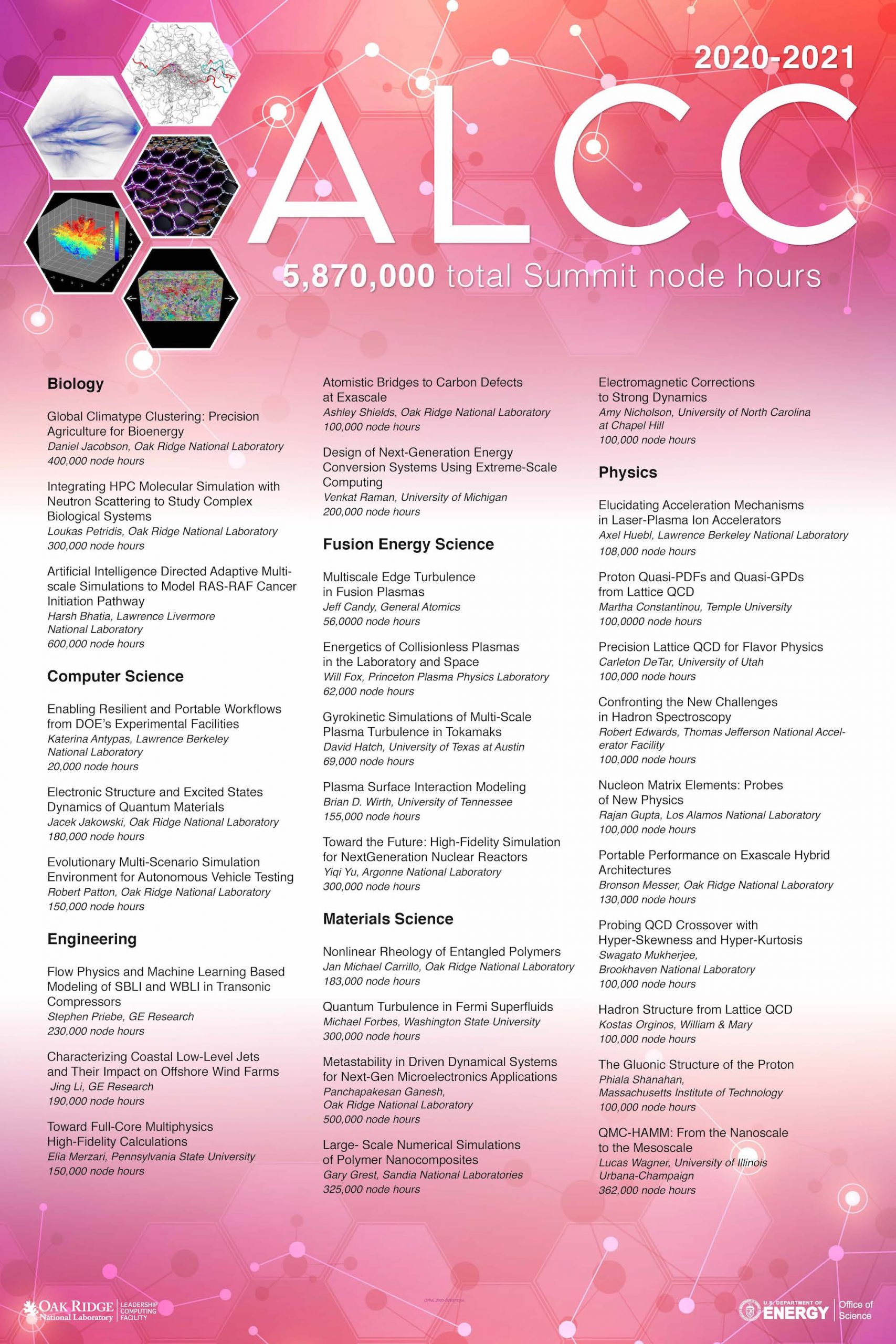
This year, 31 research teams have been awarded a combined 5.87 million node hours on the Summit supercomputer, the OLCF’s 200 petaflop IBM AC922 system. ALCC Poster pdf
UT Battelle LLC manages ORNL for DOE’s Office of Science. The Office of Science is the single largest supporter of basic research in the physical sciences in the United States and is working to address some of the most pressing challenges of our time. For more information, please visit https://energy.gov/science.


